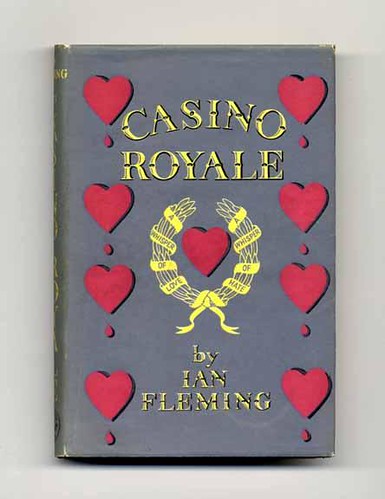
Since I've been blogging about spy spoofs and television this month, I thought that it would only be fair to also write about an Ian Fleming novel, especially since I'd never read one before.
Le Chiffre is the treasurer of a Soviet-backed trade union in France and is at Royale in order to win at baccarat so that he can replace the money that he embezzled and lost before the Soviets find out and sends someone from SMERSH to kill him. 007 is send to defeat Le Chiffre, since he is also an expert baccarat player, in order to provoke the Soviets to kill him. After hours of playing a rather tense game, Bond finally wins and hides the cheque in his hotel room. Le Chiffre is rather sore at having been left broke and so captures Bond and his beautiful, but emotionally unstable assistant, Vesper Lynd and has them brought to a remote house in the country. During the harrowing torture scene involving a carpet beater (the most difficult chapter to read in the book), a SMERSH agent arrives and kills Le Chiffre, but not Bond because he had no orders to. During the three weeks spent recovering in hospital, Bond questions why he remains at the agency and falls in love with Vesper. They go on holiday together and Bond considers quitting and settling down with Vesper, until her dishonesty, misery and terror of a man with an eye patch who's following them get the better of her. She commits suicide and leaves a note explaining that she was a double agent and her reason for working with the Soviets. Bond is upset and angry at first, but quickly regains his cold, unemotional state.
I had a great deal of trouble making my way through this book. Although it is thrilling to read, it lacked any humour to counter the number of bodies piling up. I also didn't like Bond, who was ruthless and calculating and concerned about getting the job done properly and quickly and didn't even make witty one-liners like Sean Connery did. However, my brother loves reading the Bond novels, so this type of thriller might just be a guy thing.
Some male authors tend to gloss over clothing descriptions, particularly of the female characters. However, Fleming is marvellous in describing Vesper's outfits. He's very precise in noting her outfits, particularly a black velvet non New Look Dior (aren't Fifties' velvet dresses just about one of the hardest things to find nowadays) and he details everything that she's wearing, down to the accessories, almost mathematically. But this lack of flowery language does allow one to imagine the scene in greater detail. And Bond's reactions to Vesper's outfits do give the best insight into his character and his attitude towards women, but only if you're into fashion.
I haven't seen the new movie version, or the remake as I call it, and I don't think that I'll ever get around to it, but I did read the Wikipedia summary and I have one or two problems with it. Firstly, Bond does not go around killing anything that moves, since he does spend a great deal of the book feeling guilty about the people that he's killed so far and questioning why he still works as a spy and wondering if there's a right and a wrong side in the post-war world (forgetting that he's doing his duty and he would be in the same position if me had been born in Russia) and he almost feels sad that Le Chiffre is dead, in spite of that bit with the carpet beater. Secondly, I don't like that the Americans change everything from Soviets to just terrorists or whoever it is that they're fighting at the moment. Couldn't they have just changed it, if they didn't want to set the story during the Cold War, to a vague international organization of evil and used some outrageous accents to lighten the mood. Thirdly, the card game is switched to poker, rather than baccarat which the 1967 film keeps. The game between Bond and Le Chiffre is very exciting to read and Fleming does manage to get the reader to feel the same tension that the characters in the Casino feel and wonder who's going to win and if who's going to get killed or bankrupt first. A lot of people nowadays don't know how to play baccarat, which is a game that requires intelligence and great skill at bluffing, but the book explains it using very simple language and it could be explained in a film in under two minutes. I've read the passage about baccarat a couple of times and I understand it more then I know the various hands in poker.
If you've read the book and seen the new movie, what do you think of how they compare?

No comments:
Post a Comment